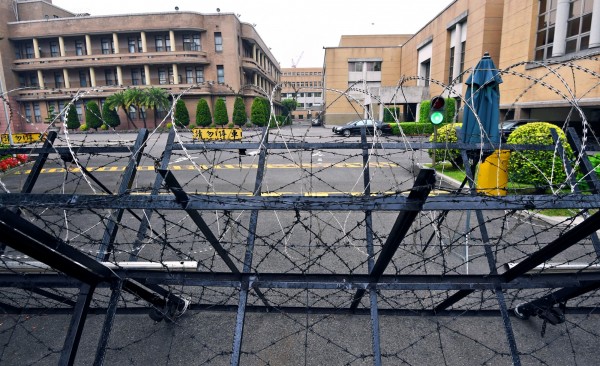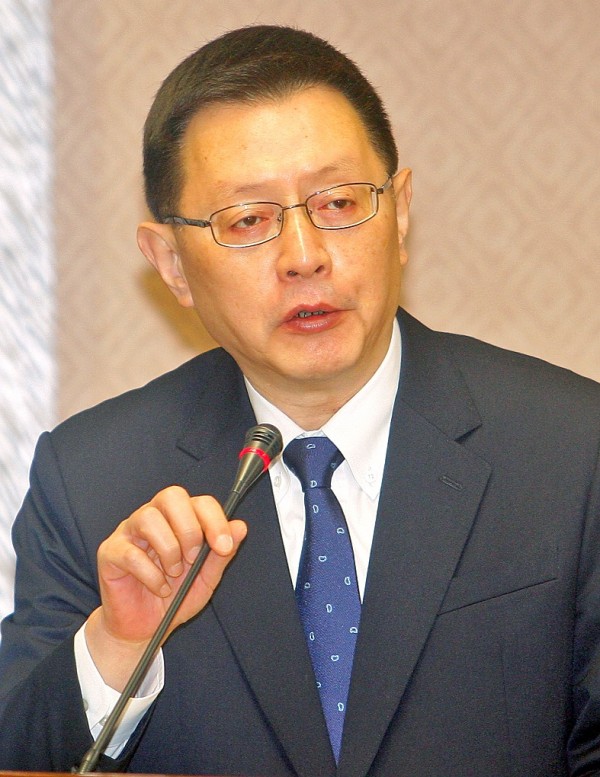《TAIPEI TIMES 焦點》 Police chief steps down ahead of rally

A razor-wire barricade closes off the main entrance of the Executive Yuan in Taipei yesterday, in preparation for the anniversary of last year’s Sunflower movement. Photo: Lo Pei-der, Taipei Times
‘OLD FRIENDS’: Wang Cho-chiun was said to have had personal differences with Minister of the Interior Chen Wei-zen, something the minister vehemently denied
By Alison Hsiao / Staff reporter
A day before the anniversary of the Sunflower movement’s occupation of the legislature, the resignation of the director-general of the National Police Agency (NPA) was accepted and barricades were erected outside the Executive Yuan and the Presidential Office Building, with security forces guarding the latter carrying guns.
Minister of the Interior Chen Wei-zen (陳威仁) yesterday confirmed that NPA Director-General Wang Cho-chiun (王卓鈞), who muddled through the controversy caused by alleged police brutality during the Sunflower movement, had tendered his resignation on Monday, and that it has been approved.
Wang issued a statement on Friday last week saying that he had not yet handed in a “paper report” applying for retirement, after media outlets reported on the previous day that he had tendered his resignation to President Ma Ying-jeou (馬英九).
Wang said he would work until the end of the month, Chen said, and a new NPA chief would take office on April 1.
Chen denied Wang was forced to resign in order to make room for Central Police University principal Tiao Cheng-sheng (刁建生), who is thought to be the leading candidate to replace Wang.
There were also media reports which alleged Chen and Wang had personal differences and did not get along well, which was said to be the main reason Wang decided to quit.
“There is no basis to those media reports,” Chen said. “Wang and I are old friends. We have no problem getting along.”
Chen was also questioned by lawmakers yesterday about the police deployment around central government buildings in Taipei on the eve of the anniversary of the beginning of the Sunflower movement.
“Netizens have ridiculed the scene as resembling that of China on the eve of the June Fourth Incident,” Democratic Progressive Party (DPP) Legislator Ho Hsin-chun (何欣純) said, referring to the Tiananmen Square massacre
The Sunflower movement refers to massive protests that activists — mostly college students — began in front of the Legislative Yuan in Taipei on March 18 last year in which they voiced their anger over the haste of the legislature’s review of the cross-strait service trade agreement. A number of civic groups have announced they plan to hold a rally at the Legislative Yuan today to mark the anniversary of the event.
Chen, whose purview includes the NPA, said he was “not clear” about the police deployment “as [Boai Special District (博愛特區)] is under the remit of the Taipei Police Department.”
“What is the government so afraid of?” asked Ho, urging Premier Mao Chi-kuo (毛治國) to face the public.
Mao cited Monday’s incident in which dozens of former freeway toll collectors stormed the Taipei apartment building where Mao lives and had violent scuffles with police, saying that “there should be a limit to how people express their different opinions.”
“[People in] Taiwanese society often do not know where the boundary between democracy and the rule of law lies when they express their views,” Mao said.
The premier did not answer Ho’s question as to whether, after all his calls for a change to the government’s attitude toward the younger generation, he still regards the Sunflower movement as simply an illegal event.
DPP Legislator Cheng Li-chun (鄭麗君) said the most effective way to show the government’s sincerity would be to drop the lawsuits against the activists who stormed the Executive Yuan compound in Taipei on March 24 last year.
Without responding directly, Mao said that while the Executive Yuan does not intend to interfere in judicial decisions, “we are calling for the greatest tolerance possible toward the [indicted] young activists.”
“However, we also have a responsibility to ensure the normal operation of the administrative system and to protect government buildings,” Mao added.
Cheng said Mao’s response “sent chills down her spine” as the Chinese Nationalist Party (KMT) authoritarian regime had uttered the same “tolerance rhetoric” before indicting pro-democracy activists involved in the Kaohsiung Incident in 1979 on sedition charges, which at that time could have led to executions.
Additional reporting by Jason Pan
新聞來源:TAIPEI TIMES

National Police Association Director-General Wang Cho-chiun responds to a question in this undated photograph. Photo: CNA















